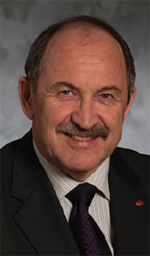 Dr. Ronald G. Smith
Dr. Ronald G. Smith
As my term as CDA president draws to a close, I am compelled to think about the future of our profession. Specifically, how is dentistry viewed in the eyes of the public? There is evidence that our patients are beginning to lose trust in dentists and misunderstand the value of the services we provide. How dentistry responds to such perceptions will help define our future position in society.
A profession can be broadly defined as a social contract between the public and trained experts within a particular discipline. In our case, dentists agree to give priority to the oral health needs of the public and, through accreditation, education and self-regulation, society grants us our title and freedom to practise. But this autonomy should never be taken for granted. It comes with the responsibility of always acting in the best interest of the public.
Professionalism is an ethical concept that refers to how we ought to act. Our dental schools are doing an admirable job of instilling the values of professionalism—honesty, integrity, compassion and fairness—through an evolving curriculum. Speaking from experience, one of the biggest challenges facing new dental graduates is juggling the often conflicting demands of being a health care provider and a business owner. The fact that patients must pay directly for our services undoubtedly influences how the public views our profession and underscores the differences in our dual roles.
A Branding Working Group (BWG), comprised of representatives from CDA and the provincial and territorial dental associations, conducted surveys and focus groups with dentists and patients in 2010. While dentists believe the public still values and trusts our profession, more patients agreed with the statement that "dentists are business people" than "dentists are doctors."
Within our ranks, we believe that dentistry remains a valued profession. But if the public now sees us as business owners rather than health care professionals, it is a signal that we need to make greater efforts to reinforce the health care aspects of our profession.
Along these lines, CDA convened a Consultative Forum in April entitled "Putting Professionalism on the Agenda." This event brought together representatives from organized dentistry, the dental specialties and academia. While there is likely no magic bullet solution, we need to bring greater awareness to the challenges facing the profession and to address the issues from a variety of fronts. We will keep you posted on the outcomes of the forum.
Another proactive initiative is the launch of a national campaign spearheaded by the BWG. A series of advertisements, in print, television and radio, will soon be rolled out across the country. The campaign message will reinforce the value of dentistry and the importance of the dental exam.
It appears that the public may not fully appreciate the value of dentists as trusted oral health care leaders in society. It is incumbent upon every dentist to uphold the ideals of professionalism which have been established by our predecessors. The dentist–patient relationship is fundamental. Every interaction between a dentist and a patient is an opportunity to demonstrate why dentistry is a valued profession and should remain so. Simply talking to your patients can make a big difference.
I have been honoured to serve as CDA president this year. In my meetings with hundreds of colleagues across the country, I encountered many caring, selfless and skilled dentists. It gives me great confidence that Canadian dentists can and will rise to the challenge of maintaining our status in society. Let's make sure we all do our part.
